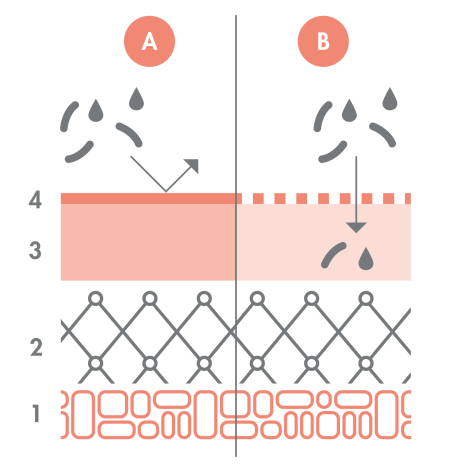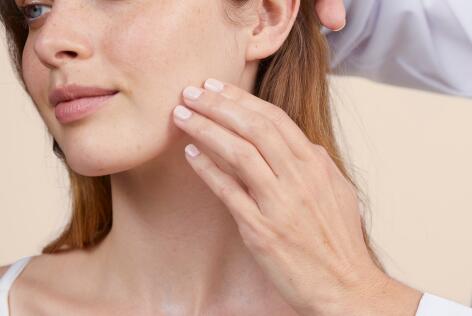Causes and prevention
Understanding skin hypersensitivity to care for it better. Do you have skin that gets tight or hot easily? Tingling or redness on the face at the slightest attack? When you have hypersensitive and reactive skin, discomfort is very common. To provide lasting relief from these symptoms, it is important to identify the cause of the irritation and then choose the most appropriate solution.

Where does this hypersensitivity of the skin come from?
The epidermis is a protective barrier. Its first task is to prevent external elements from penetrating the skin. If this epidermal barrier is weakened, it is unfortunately no longer able to stop external aggressors, such as irritants or allergens. This is what happens with reactive skin, whose protective shield is no longer strong enough to protect it effectively.
Its second task is to prevent the water contained in the skin from escaping. In the case of some hypersensitive skin, the epidermal barrier is too weak to carry out this role properly. The skin's water evaporates more easily than normal, leaving the skin drier and dehydrated (and therefore more fragile and uncomfortable).
A: Normal skin
B: Reactive skin
The other cause of hypersensitivity: overly sensitive sensory receptors
There are many sensory receptors on the surface of the skin. Their role is to transmit an alert to the brain when the skin is attacked, thus causing a sensation (tingling, tightness, flushes, etc.). When skin is hypersensitive, these “ overly chatty ” receptors send information to the brain at the slightest opportunity, causing discomfort, itching and burning.

HYPERSENSITIVE AND REACTIVE SKIN
What triggers a reaction?
External aggressors
Skin is unique from person to person and can react differently to external aggressors. When hypersensitive skin reacts, however, the aggressors are often the following:
- The sun, so much so that sometimes you may think that you have a sun allergy.
- Wind, air conditioning and temperature variations create irritation and trigger uncomfortable reactions, especially if you have skin that is reactive to cold.
- Water, because it is loaded with minerals, which can cause unexpected skin sensations, such as on skin that is reactive to limescale.
- Pollution.
- Chemicals and irritants found in the composition of some cosmetics, which can trigger a strong reaction in the skin on first application or after prolonged use.
Internal causes:
Does a rash seem to have appeared for no reason? Do you have an itchy face but can't identify the trigger? Individual factors are difficult to determine as there are many factors that vary over the course of a lifetime. Indeed, hypersensitive skin can react to elements such as:
- Hormonal changes related to puberty, the menstrual cycle, pregnancy or menopause.
- Psychological factors and strong emotions, such as stress or anger.
Are there any solutions for hypersensitive skin? Don't worry, yes.
Sterile Cosmetics®: products adapted to hypersensitive skin.
If your skin is hypersensitive, you have probably already noticed that it cannot tolerate certain cosmetic products. Specific ingredients cause this. Sterile Cosmetics® is the most suitable solution for the most demanding skin types. Preservative and fragrance-free, Sterile Cosmetics® contain only the essential ingredients to soothe, moisturise and protect your skin. As the name suggests, the products are manufactured in a sterile environment, and the closure system is hermetically sealed to prevent contamination. Therefore, no preservatives are needed and tolerance is optimal. Sterile Cosmetics® moisturise and soothe the skin with the utmost respect, minimising any risk of skin reaction.

A simple and effective care routine
Make-up removers, lotions, balms, creams: have you tried several cosmetic products with different formulas to try to soothe your hypersensitive skin? The more different products you use, the more potentially irritating substances your skin comes into contact with. It can then be difficult to identify the ingredients that cause your skin to overreact. One of our main pieces of advice to people with skin sensitivities is, therefore, to review their skincare routine. The aim is to avoid increasing the number of cosmetic products and to tilt the playing field by focusing on safe, fragrance-free and preservative-free products, therefore, limiting the risks of irritation.
OUR SOLUTIONS FOR HYPERSENSITIVE AND INTOLERANT SKIN
Eau Thermale Avène skincare products designed to make you feel better in your uncomfortable skin.
- Control Soothing skin recovery balm
Tolerance
Control Soothing skin recovery balmHydrates - Calms - Strengthens the skin barrier
NEWSLETTER
We’re always here for your skin!
All our tips for taking care of your skin day to day.

Which skin care routine should you adopt?
Identify what it really needs with the help of our experts and discover the most suitable skin care routine for you.

